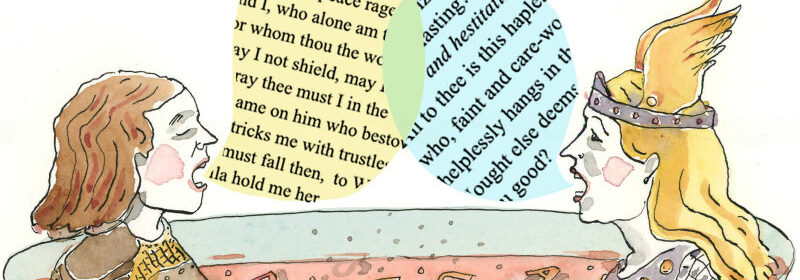Opera? It’s really just Home and Away with music

Save articles for later
Add articles to your saved list and come back to them any time.
Think of splendid poetry. Think of great oratory. Think of deathless words that ring with profundity. Think of the Gettysburg Address. Then think of it declaimed not by Lincoln, but by Les Patterson on a bender, incorporating all his spittle, snicker, belch and blunder: “… govment of the people, nby the burp people, nforr the people, Are you with me? No worries.”
Or think of Martin Luther King’s I Have A Dream, not spoken by him but by Foghorn Leghorn, a Texan cartoon rooster. “Free at last, free at last. I say, are ya listenin’ to me boy? We’re free at last.” Even the most hallowed words can be made foolish by their delivery. Similarly, the most banal can be disguised and made to sound profound.
Opera sung in English has all the hallmarks of Home and Away.Credit:
I say opera cannot be sensibly sung in English. The workaday exposition needed to advance a plot cannot be thundered and falsettoed without making me snort pressurised laughter through my ears. I attended a lecture by a musical knight who said that music super-powered words. And he played us some lines of the libretto from Voss. But if you amplify banality and bedeck it with fancy notes, you have engineered a kind of Soviet stridency that the limp limerick of the libretto can’t carry. You have built a castle for a mouse.
In this column I have written in mockery of religions, I have damned people’s cats, I have even hinted that the feminist revolution may have entered its Jacobin phase. But now I fear I’m about to make lifelong enemies in the gardened estates of Brighton, where the offspring of the offspring of the offspring of colonial robbers pluck weeds while wearing cashmere and cords.
When listening to opera I’m dumbfounded that anyone can enjoy it. Then I’m gripped by the suspicion that no one does. Sopranos and tenors holler their intimacies like hillbillies on payday. I get an inkling the audience is unanimously apostate, but remains silent, no one wanting to be the first heretic. Theatregoers are cowards, afraid of stumbling into thickets of heterodoxy. How often does a couple walk from a play, he beginning to spout the hatchet job he has been composing throughout the last act, “What a load of …” “Yes,” she interjects, “So many mind-blowing ideas.” “Yyyy…eah,” he agrees, wanting to be agreeable. “So many ideas.”
Credit:
Johnny Mercer, who penned Moon River, once said of a musical, “I could eat a bowl of alphabet soup and shit better lyrics”. This is true in a way he didn’t mean. I’m sure his subsequent scat would be a perplexing document. Something that might stymie the boffins of Bletchley Park. But it is this very incomprehensibility that enhances an Italian libretto. When lyrics are sung in a language we don’t speak, our needful hearts endow them with a profundity they don’t have. We take it for granted some Romeo is singing timeless words of love when, often as not, he’s telling Juliet he’ll meet her behind the pub at five if the No. 8 is running on time.
I like classical music. Orchestras make me think of John Harrison’s clocks; meticulously crafted and assembled filaments and cogs of slow-hammered metals and finely carved woods placed, and synched, to push against each, react to each other, then draw each other on in common purpose, so that rivulets of virtuosity become a great leaping river towards epiphany, heartsong, loveliness. But the libretto … Ahh, the libretto is where we run into Home and Away.
When it’s in Italian, it’s not so bad. Or German. You tend to believe it must be poetic and profound. Otherwise, why would these fevered advocates wail it with such abandon? But in English, the banalities of the baritone become clear. “Polly want a cracker” about sums the thing up. It seems to me an outrage that a flautist would ride shotgun on this sort of nonsense.
The overlords of the medieval church were right about the perils of translating The Bible into English. In Latin it was incomprehensible and thus limitlessly wise. But a drunken costermonger could see right through the thing once he could read it in English. Ditto The Koran. And it’s the same with operas. Translate almost any libretto into English and you’ll find it’s pretty much Cath and Kim squabbling at the sink.
So let’s hear it for incomprehensibility, that bowl of alphabet soup wherein lies limitless DIY profundity. Sing your song in German and they’ll never know it’s tosh. Warble it in Italian, and they’ll take it for Johnny Mercer.
Most Viewed in Culture
From our partners
Source: Read Full Article

